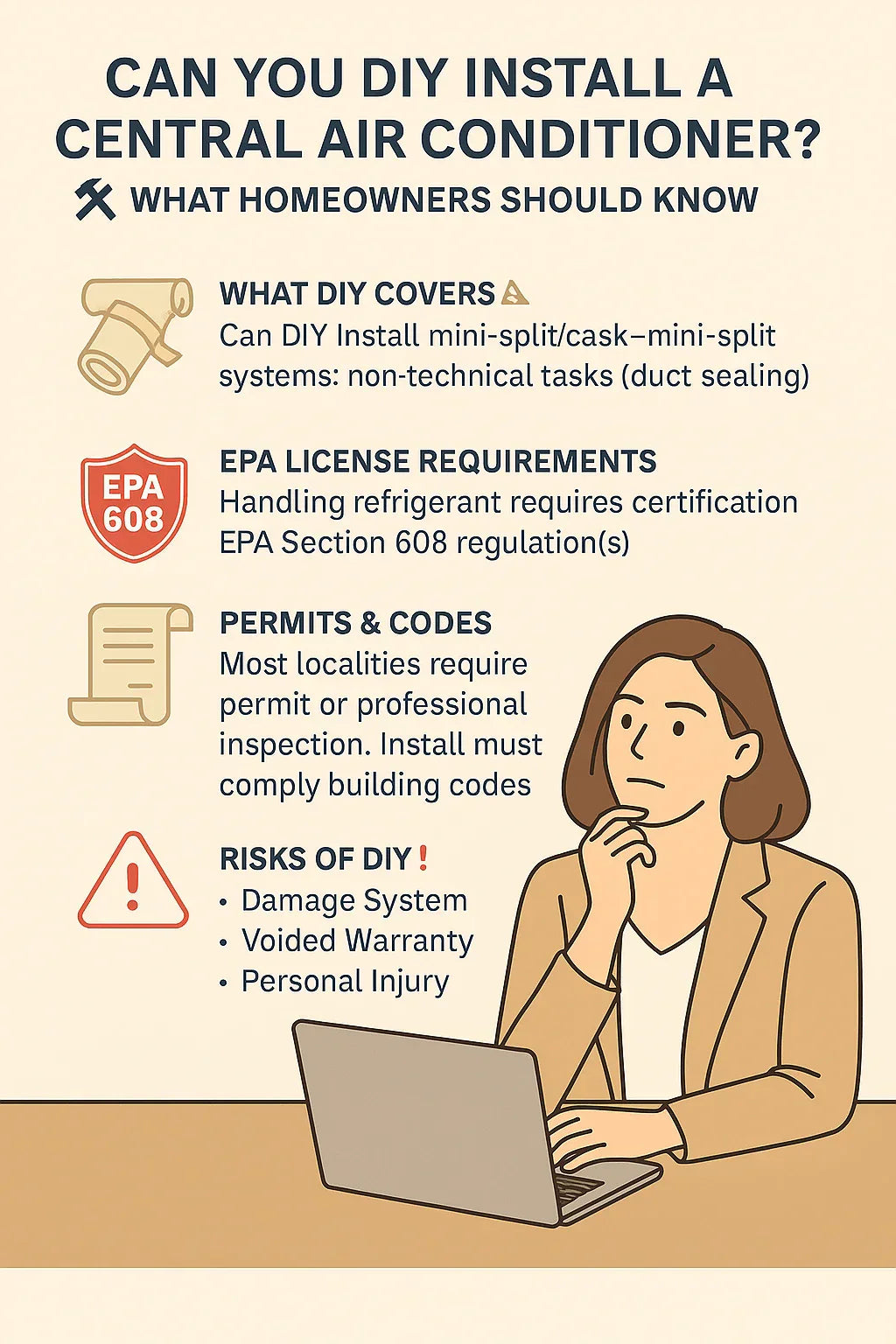🔎 Introduction: The Temptation to DIY
Central air conditioning installation can cost thousands, making it tempting for savvy homeowners to consider a DIY approach. But while minor HVAC tasks may be suitable for skilled DIYers, full central AC installation involves numerous legal, safety, and technical hurdles.
In this guide, we’ll break down what parts of a central AC project you can tackle yourself, what requires professional licensing, and the real risks of DIY central air installation.
🚫 The Short Answer: No Full DIY for Central AC
Unlike simple window units or portable systems, central air conditioning is not designed for full DIY installation.
Why?
-
Refrigerant handling requires EPA certification.
-
Electrical work may require licensed electricians.
-
Permits are often legally required.
-
Improper installation voids warranties and reduces efficiency.
🔧 Which Parts CAN You DIY?
While full system installation is off-limits, homeowners may safely handle:
| Task | DIY Possible? |
|---|---|
| Site prep (clearance, pad prep) | ✅ |
| Thermostat installation | ✅ |
| Duct cleaning | ✅ |
| Air filter replacement | ✅ |
| Outdoor condenser pad leveling | ✅ |
| Low-voltage wiring (in some areas) | ⚠️ |
| Refrigerant line connection | 🚫 |
| Charging refrigerant | 🚫 |
| System pressure testing | 🚫 |
| Electrical panel wiring | 🚫 |
For a full list of HVAC licensing requirements, visit EPA’s Section 608 certification page.
📜 Legal & Regulatory Barriers
1️⃣ EPA Certification
-
Federal law requires anyone handling refrigerants to hold EPA Section 608 Certification.
-
This applies to refrigerant line hookup, charging, and leak testing.
2️⃣ Electrical Codes
-
High-voltage connections require proper permits and often licensed electricians.
3️⃣ Local Permits
-
Many cities require inspections and permits for any central AC installation.
-
Unpermitted work can lead to fines, forced removal, or voided home insurance.
⚠️ Technical Risks of DIY Installation
-
Improper refrigerant charge reduces efficiency.
-
Poor airflow design causes hot/cold spots.
-
Leaks in line sets damage the compressor.
-
Faulty electrical work creates fire hazards.
-
Void manufacturer warranties.
-
Shortened system lifespan.
🔬 Case Study: DIY Attempt Gone Wrong
Scenario: Homeowner installs condenser and runs refrigerant lines but skips pressure testing.
Result:
-
Slow refrigerant leak develops.
-
Compressor overheats and fails after 18 months.
-
Warranty denied due to non-certified install.
-
Full replacement needed = $7,000 loss.
🏷 The Cost Breakdown
| Approach | Typical Cost |
| Full Professional Install | $5,000–$15,000 |
| DIY Partial Prep + Pro Final Install | $4,500–$12,000 |
| Full Illegal DIY | Costly legal risks, no warranty |
Hiring a pro may seem costly upfront but can save thousands long-term.
💡 Alternative: Ductless Mini-Split DIY Kits
-
Some mini-split systems come pre-charged with sealed line sets.
-
Limited DIY-friendly models exist (brands like Mr. Cool).
-
Still require careful prep and occasional pro assistance.
For ductless options, see HVAC.com's ductless mini-split guide.
✅ What Professionals Bring to the Table
-
Proper sizing via Manual J calculations
-
Correct refrigerant charging
-
Leak testing and pressure verification
-
Warranty-backed work
-
Code-compliant electrical work
-
Permit handling and final inspections
Certified contractors ensure long-term performance, safety, and legal compliance.
🔑 Key Takeaways
-
Full central AC DIY installation is unsafe and typically illegal.
-
Partial prep work is possible but limited.
-
Always hire licensed HVAC pros for system hookup and final commissioning.
-
Ductless DIY kits offer limited safe options for smaller spaces.
🏁 Conclusion: Know Your Limits
Installing a central air conditioner isn’t like assembling IKEA furniture—it’s complex, regulated, and safety-critical. Attempting full DIY installation puts your home, family, and investment at serious risk.
For safe, efficient, code-compliant installations, browse pre-vetted systems and professional options through reputable suppliers like The Furnace Outlet, where expert support is built in.
In the next topic we will read about: Maintaining Your Central Air Conditioner for Peak Performance







